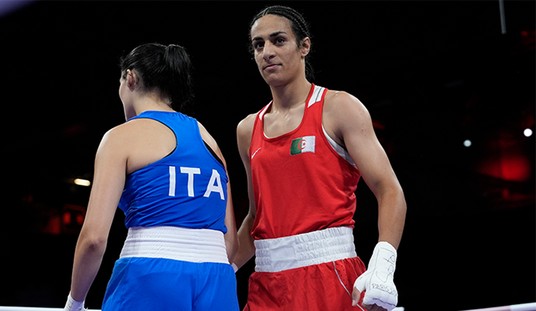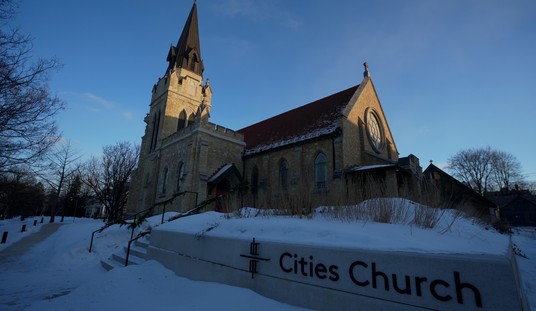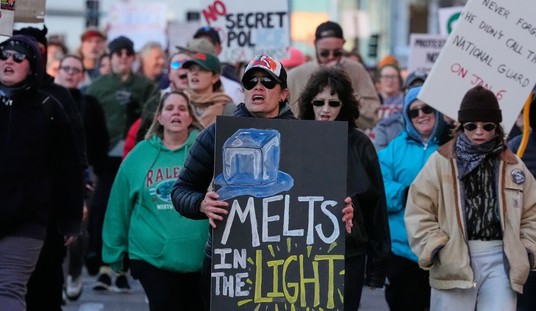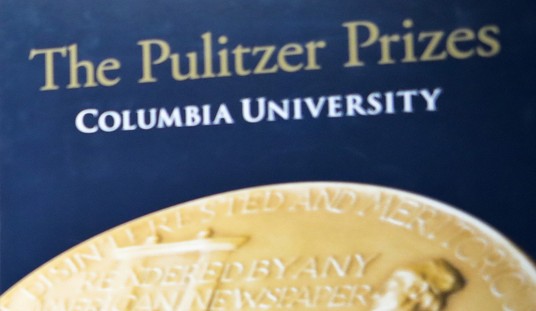Don’t take this excellent and self-effacing essay from Slate’s William Saletan as an endorsement of George Zimmerman’s actions. Instead, it’s an indictment of the sensationalist media coverage that distorted or outright manufactured narratives in the case, and of the activists on all sides of the ledger who have exploited a tragedy for political gain. Only after informing himself by watching the actual trial, evidence, and closing arguments did Saletan have his epiphany (via Amy Alkon):
Trayvon Martin is dead, George Zimmerman has been acquitted, and millions of people are outraged. Some politicians are demanding a second prosecution of Zimmerman, this time for hate crimes. Others are blaming the tragedy on “Stand Your Ground” laws, which they insist must be repealed. Many who saw the case as proof of racism in the criminal justice system see the verdict as further confirmation. Everywhere you look, people feel vindicated in their bitter assumptions. They want action.
But that’s how Martin ended up dead. It’s how Zimmerman ended up with a bulletproof vest he might have to wear for the rest of his life. It’s how activists and the media embarrassed themselves with bogus reports. The problem at the core of this case wasn’t race or guns. The problem was assumption, misperception, and overreaction. And that cycle hasn’t ended with the verdict. It has escalated.
I almost joined the frenzy. Yesterday I was going to write that Zimmerman pursued Martin against police instructions and illustrated the perils of racial profiling. But I hadn’t followed the case in detail. So I sat down and watched the closing arguments: nearly seven hours of video in which the prosecution and defense went point by point through the evidence as it had been hashed out at the trial. Based on what I learned from the videos, I did some further reading.
It turned out I had been wrong about many things. The initial portrait of Zimmerman as a racist wasn’t just exaggerated. It was completely unsubstantiated. It’s a case study in how the same kind of bias that causes racism can cause unwarranted allegations of racism. Some of the people Zimmerman had reported as suspicious were black men, so he was a racist. Members of his family seemed racist, so he was a racist. Everybody knew he was a racist, so his recorded words were misheard as racial slurs, proving again that he was a racist.
Be sure to read it all. This may be the best column Saletan has ever written, and I don’t want to over-excerpt. However, I do want to highlight one more point in his conclusion:
In court, evidence and scrutiny have exposed these difficult, complicated truths. But outside the court, ideologues are ignoring them. They’re oversimplifying a tragedy that was caused by oversimplification. Martin has become Emmett Till. New York Mayor Michael Bloomberg is using the verdict to attack Florida’s “Stand Your Ground” law, which wasn’t invoked in this case. The grievance industrial complex is pushing the Department of Justice to prosecute Zimmerman for bias-motivated killing, based on evidence that didn’t even support a conviction for unpremeditated killing. Zimmerman’s lawyers have teamed up with members of the Congressional Black Caucus, inadvertently, to promote the false message that Zimmerman’s acquittal means our society thinks everything he did was OK.
It wasn’t OK. It was stupid and dangerous. It led to the unnecessary death of an innocent young man. It happened because two people—their minds clouded by stereotypes that went well beyond race—assumed the worst about one another and acted in haste. If you want to prevent the next Trayvon Martin tragedy, learn from their mistakes. Don’t paint the world in black and white. Don’t declare the whole justice system racist, or blame every gun death on guns, or confuse acquittal with vindication. And the next time you see somebody who looks like a punk or a pervert, hold your fire.
In my column today for The Week, I also argue that all sides seem more interested in vindicating their political hobby horses rather than learn a lesson from the entire tragic affair. Few seem to find empathy with the principals in the case, when (like most tragedies) the human cost is all too apparent, and that justice for anyone is elusive in this case:
No party in this case will feel that justice was done. The police had originally closed its investigation of Zimmerman, concluding that the evidence was lacking to charge him with manslaughter or murder. The state only brought charges against Zimmerman after public outrage forced them to reopen the investigation. The media stoked the fires with inaccurate reporting, arguably to the point of libel, driving a sensational narrative of racism that the FBI concluded didn’t exist, and which ignored Zimmerman’s own multiethnic heritage. The New York Timespractically coined the term “white Hispanic” for Zimmerman, which fueled the racial angle of the case. The sensationalism and inaccuracies led to the demand of a second-degree murder charge against Zimmerman, an overreach that the prosecution didn’t come close to proving.
Even with the acquittal, I doubt that Zimmerman feels as though he’s seen justice. He’s been vilified and threatened for more than a year, and will be for the rest of his life.
That pales in comparison to the experience of the victim’s family. Trayvon Martin, 17, was on his way to see his father when he got killed. He was unarmed and merely walking through the neighborhood when the confrontation happened, and Trayvon got shot and killed anyway. The police at the time didn’t take action against the man who shot him. After more than a year of demanding justice, they don’t even have the comfort of a verdict.
As the father of a young man myself, I can’t help but put myself in the Martins’ shoes. My son, perhaps like Trayvon, had the typical teenage contempt for authority (oftentimes mine, but also the police and nosy neighbors) and got into more than a few ill-advised confrontations. My son got the chance to outgrow it. Trayvon didn’t. …
Archetypes and narratives may allow us to put events like this shooting on our hobby horses for the benefit of personal agendas, but those archetypes and narratives contributed to this tragic outcome. Ironically, instead of learning a lesson from that, we have thought leaders, celebrities, and ordinary people stoking anger and fear in the aftermath of the trial, rather than finding ways to reduce and eliminate those barriers so that we can avoid this kind of heartbreak the next time.
Everyone needs to step back from their anger and fear, and understand that both of those is how we got here in the first place.








Join the conversation as a VIP Member